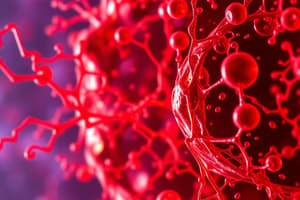Podcast
Questions and Answers
What is the primary function of the Gap 1 phase (G1 phase) in the cell cycle?
What is the primary function of the Gap 1 phase (G1 phase) in the cell cycle?
- Active RNA and protein synthesis (correct)
- Cytoplasmic division
- DNA duplication
- Chromosome separation
During which phase of the cell cycle do cells contain 46 identical pairs of chromosomes?
During which phase of the cell cycle do cells contain 46 identical pairs of chromosomes?
- Gap 2 phase
- Gap 1 phase
- Synthesis phase (correct)
- Mitosis
What distinguishes necrosis from apoptosis in cell death?
What distinguishes necrosis from apoptosis in cell death?
- Apoptosis leads to cell swelling
- Necrosis is programmed cell death
- Apoptosis is an uncontrolled process
- Necrosis typically results in inflammation (correct)
What happens to cells that are terminally differentiated in the cell cycle?
What happens to cells that are terminally differentiated in the cell cycle?
What characterizes the Gap 2 phase (G2 phase) of the cell cycle?
What characterizes the Gap 2 phase (G2 phase) of the cell cycle?
How does the cell's size change during the Gap 1 phase (G1 phase)?
How does the cell's size change during the Gap 1 phase (G1 phase)?
Which of the following is not a phase of interphase?
Which of the following is not a phase of interphase?
Which statement about the cell cycle is true regarding non-dividable cells?
Which statement about the cell cycle is true regarding non-dividable cells?
What is the primary purpose of the G2/M checkpoint in the cell cycle?
What is the primary purpose of the G2/M checkpoint in the cell cycle?
Which stage of cell development involves an increase in the number of cells through mitotic divisions?
Which stage of cell development involves an increase in the number of cells through mitotic divisions?
What characterizes necrosis compared to apoptosis?
What characterizes necrosis compared to apoptosis?
Which proteins regulate progression through the cell cycle?
Which proteins regulate progression through the cell cycle?
What is the role of the metaphase spindle checkpoint?
What is the role of the metaphase spindle checkpoint?
Which of the following is NOT a major stage of cell development?
Which of the following is NOT a major stage of cell development?
Which of these statements is true regarding the cell cycle duration?
Which of these statements is true regarding the cell cycle duration?
What is the significance of integration in cell development?
What is the significance of integration in cell development?
Flashcards
Cell Cycle Definition
Cell Cycle Definition
A series of events leading to cell division (mitosis) and rest (interphase) forming new cells.
Interphase Stages
Interphase Stages
The period between cell divisions, divided into G1, S, and G2 phases.
G1 Phase (Gap 1)
G1 Phase (Gap 1)
Cell growth and preparation for DNA replication; chromosomes are single.
S Phase (Synthesis)
S Phase (Synthesis)
Signup and view all the flashcards
G2 Phase (Gap 2)
G2 Phase (Gap 2)
Signup and view all the flashcards
Dividable Cells
Dividable Cells
Signup and view all the flashcards
Non-dividable Cells (G0)
Non-dividable Cells (G0)
Signup and view all the flashcards
Mitosis
Mitosis
Signup and view all the flashcards
Chromosome in G2 phase
Chromosome in G2 phase
Signup and view all the flashcards
Cell Cycle Checkpoints
Cell Cycle Checkpoints
Signup and view all the flashcards
Cell Cycle Progression Regulation
Cell Cycle Progression Regulation
Signup and view all the flashcards
Cell Growth
Cell Growth
Signup and view all the flashcards
Cell Differentiation
Cell Differentiation
Signup and view all the flashcards
Necrosis
Necrosis
Signup and view all the flashcards
Apoptosis
Apoptosis
Signup and view all the flashcards
Study Notes
Cell Cycle & Cell Death
- Learning Objectives:
- Define the cell cycle and illustrate the phases.
- Explain the events occurring in each phase.
- Recognize the relationship between cell differentiation and the cell cycle.
- Differentiate between cell death by apoptosis and necrosis.
- Define apoptosis and its characteristics.
The Cell Cycle
- Definition: A sequence of events during cell division and rest (interphase), producing new cells.
- Periods:
- Interphase: Gap 1 (G1), Synthesis (S), and Gap 2 (G2) phases.
- Mitosis: Nucleus (karyokinesis) and cytoplasm (cytokinesis) division.
Stages of Cell Cycle
-
G₁ (Gap 1) Phase:
- Interval between mitosis and synthesis.
- Chromosomes are s-chromosomes (46 chromosomes).
- The nucleus shows no increase in DNA content.
- Active RNA and protein synthesis, growth.
- Cells either divide again or enter a non-dividing state (G₀).
-
S (Synthesis) Phase:
- DNA molecules and centrioles duplicate.
- The cell contains 46 identical pairs of chromosomes (often called double chromosomes).
-
G₂ (Gap 2) Phase:
- Period between synthesis and mitosis (relatively short).
- Cells prepare for mitotic division, synthesize cytoplasmic material (e.g., proteins).
- Organelles increase in number.
- Chromosomes are double chromosomes (double the DNA compared to G₁).
- Most cells transition from G₂ to the next mitosis.
-
Mitosis (M):
- Chromosomes shorten, align in the cell's middle, then separate.
- Creates two genetically identical daughter cells.
- Cell cycle completion time is 10-30 hours, and the cycle begins again after mitosis completion.
- Includes stages Prophase, Metaphase, Anaphase, Telophase.
Cell Cycle Checkpoints
- Checkpoints: Control points to ensure each phase is completed.
- Stages:
- Start (restriction) checkpoint (before S phase)
- G₂/M checkpoint (ensuring DNA replication is complete)
- Metaphase checkpoint (ensuring all chromosomes are correctly attached to the mitotic spindle).
- Control Mechanism: Cyclin-dependent kinases (CDKs) and cyclins regulate the entire cycle.
Cell Development
- Stages:
- Growth: Increase in mass (size or number of cells).
- Differentiation: Developing new features and functions.
- Integration: Growth and differentiation are balanced, creating tissues and organs.
Cell Death
-
Necrosis:
- Cell death due to external factors (e.g., injury, toxins).
- The cell swells, chromatin clumps, and cytoplasm gets weakly stained.
- The cell bursts, releasing contents.
-
Apoptosis:
- Normal cell death due to internal factors (programmed cell death).
- A rapid, highly regulated process that eliminates defective or unneeded cells.
- The cell shrinks, DNA is condensed and degraded.
- Forms apoptotic bodies, which are then removed by phagocytes (cells specialized for debris removal).
Studying That Suits You
Use AI to generate personalized quizzes and flashcards to suit your learning preferences.




